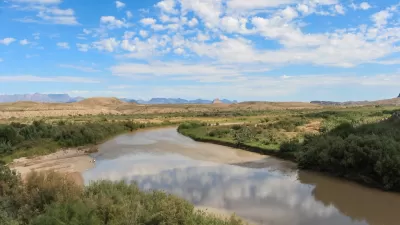Despite flowing through ten different nations, the Nile's water is only technically the property of Egypt and Sudan. The other eight nations are trying to change that. But as the debate heats up, the river's ecosystem may be caught in the cross-fire.
This piece from Yale Environment 360 looks at the complicated history of the Nile and how division of its water rights could exacerbate environmental damage to its ecosystem.
"Yet as the nations of the Nile bicker over its future, nobody is speaking up for the river itself - for the ecosystems that depend on it, or for the physical processes on which its future as a life-giving resource in the world's largest desert depends. The danger is that efforts to stave off water wars may lead to engineers trying to squeeze yet more water from the river - and doing the Nile still more harm. What is at risk here is not only the Nile, but also the largest wetland in Africa and one of the largest tropical wetlands in the world - the wildlife-rich Sudd.
In May, five upstream Nile nations - Ethiopia, Uganda, Kenya, Tanzania and Rwanda - signed a treaty declaring their rights to a share of the river's flow. They said they would no longer be bound by a treaty drawn up by the British in 1959. That treaty had given Egypt 55.5 cubic kilometers of the river's flow and Sudan 18.5 cubic kilometers, but no formal entitlements for any nation upstream."
FULL STORY: Does Egypt Own The Nile? A Battle Over Precious Water

Alabama: Trump Terminates Settlements for Black Communities Harmed By Raw Sewage
Trump deemed the landmark civil rights agreement “illegal DEI and environmental justice policy.”

Planetizen Federal Action Tracker
A weekly monitor of how Trump’s orders and actions are impacting planners and planning in America.

How Atlanta Built 7,000 Housing Units in 3 Years
The city’s comprehensive, neighborhood-focused housing strategy focuses on identifying properties and land that can be repurposed for housing and encouraging development in underserved neighborhoods.

In Both Crashes and Crime, Public Transportation is Far Safer than Driving
Contrary to popular assumptions, public transportation has far lower crash and crime rates than automobile travel. For safer communities, improve and encourage transit travel.

Report: Zoning Reforms Should Complement Nashville’s Ambitious Transit Plan
Without reform, restrictive zoning codes will limit the impact of the city’s planned transit expansion and could exclude some of the residents who depend on transit the most.

Judge Orders Release of Frozen IRA, IIJA Funding
The decision is a victory for environmental groups who charged that freezing funds for critical infrastructure and disaster response programs caused “real and irreparable harm” to communities.
Urban Design for Planners 1: Software Tools
This six-course series explores essential urban design concepts using open source software and equips planners with the tools they need to participate fully in the urban design process.
Planning for Universal Design
Learn the tools for implementing Universal Design in planning regulations.
Jessamine County Fiscal Court
Caltrans
Institute for Housing and Urban Development Studies (IHS)
City of Grandview
Harvard GSD Executive Education
Toledo-Lucas County Plan Commissions
Salt Lake City
NYU Wagner Graduate School of Public Service




























